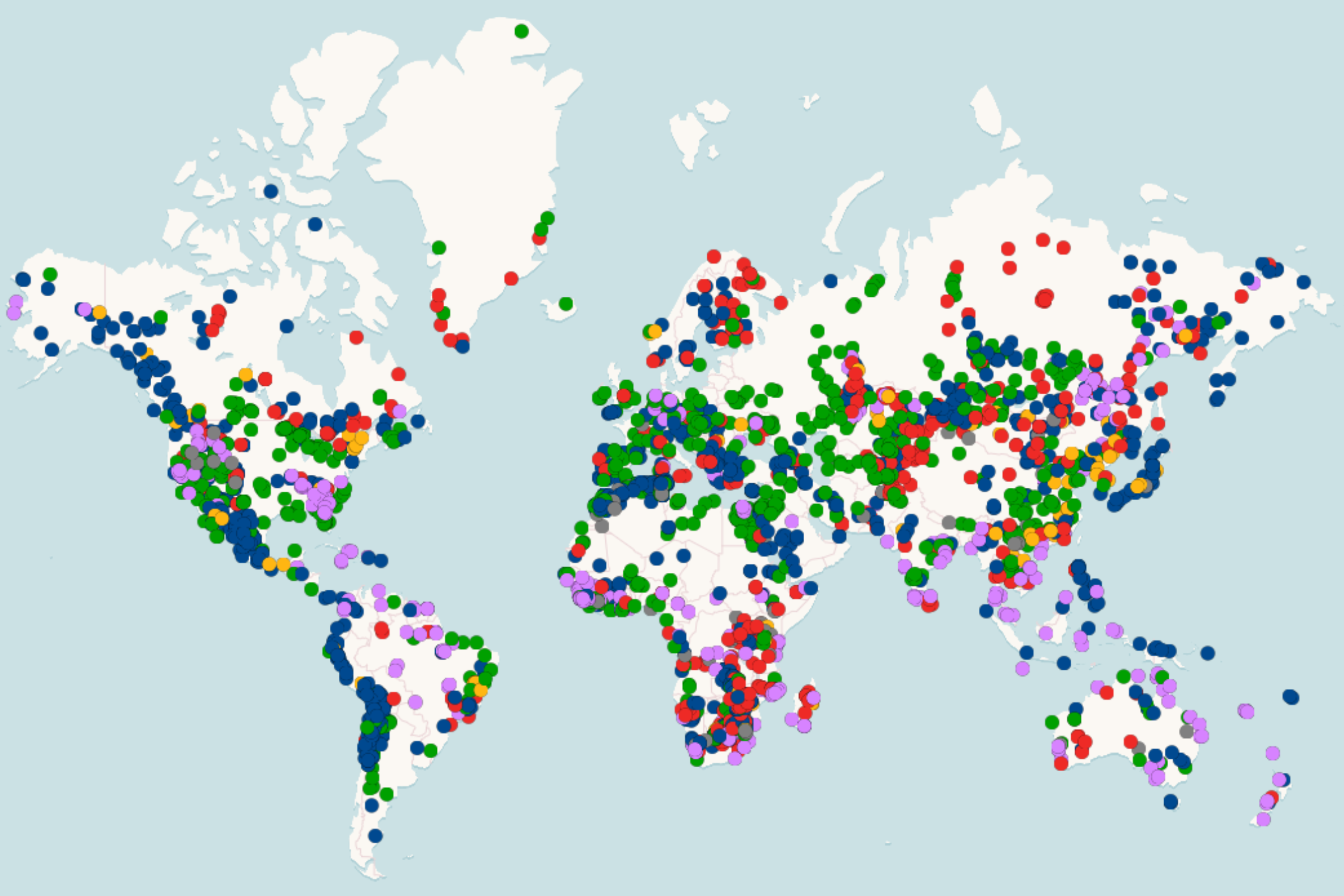Rare Earth Minerals: Fueling A New Cold War?

Table of Contents
The Geopolitical Significance of Rare Earth Minerals
The geopolitical landscape is significantly shaped by the distribution and control of rare earth minerals. These seventeen elements, while not individually rare, are often found together in low concentrations, making extraction and processing complex and expensive. This concentration of resources, combined with their critical role in advanced technologies, creates a potent source of economic and political leverage.
-
China's dominance in rare earth mining and processing: China currently dominates the rare earth mineral supply chain, controlling a vast majority of global production and processing. This dominance gives China significant economic leverage and influence over nations reliant on these minerals for their technological industries and defense capabilities. This situation raises concerns about potential supply disruptions and economic coercion.
-
The strategic importance of rare earth minerals for defense technologies: Rare earth elements are indispensable components in advanced weaponry systems, including guided missiles, radar systems, and night-vision technology. Their strategic importance to national defense capabilities cannot be overstated. A nation's access to these minerals is directly tied to its military strength and technological prowess.
-
The implications for national security: Over-reliance on a single supplier, particularly one with potentially adversarial geopolitical interests, creates significant vulnerabilities for national security. This dependence compromises a nation's technological independence and leaves it susceptible to supply chain disruptions or economic coercion.
-
Diversification efforts: Recognizing these risks, many nations are actively pursuing diversification strategies, including investing in domestic rare earth mining and processing, forging strategic partnerships with alternative suppliers, and exploring recycling and resource recovery technologies. These efforts are crucial for reducing reliance on China and enhancing national security.
The Role of Rare Earth Minerals in Technological Advancements
The demand for rare earth minerals is surging, driven primarily by the rapid expansion of renewable energy technologies and the proliferation of electric vehicles (EVs). This increasing demand is further fueled by the continued growth of consumer electronics and other high-tech industries.
-
The demand for rare earth minerals in renewable energy technologies (wind turbines, solar panels): Rare earth magnets are essential components in wind turbine generators and some types of solar panels, making them crucial for the transition to clean energy. As the world accelerates its shift towards renewable energy, the demand for these minerals will only continue to rise.
-
The crucial role in electric vehicle manufacturing: Electric vehicle motors rely heavily on powerful, lightweight rare earth magnets for optimal performance. The global shift towards EVs is driving an exponential increase in demand for these minerals.
-
Applications in consumer electronics and other high-tech industries: Rare earth elements are found in a wide array of consumer electronics, from smartphones and computers to medical imaging equipment and advanced manufacturing tools. This ubiquitous presence highlights their importance in the modern technological landscape.
-
The impact of supply chain disruptions on technological innovation: Disruptions to the rare earth mineral supply chain can significantly impede technological innovation and economic growth. The scarcity of these minerals could create bottlenecks, slowing down the development and deployment of new technologies.
Securing Rare Earth Mineral Supply Chains
Securing a reliable and sustainable supply of rare earth minerals requires a multifaceted approach that encompasses domestic production, international cooperation, and responsible mining practices.
-
Investing in domestic mining and processing: Governments worldwide are increasingly investing in domestic rare earth mining and processing capabilities to reduce reliance on foreign sources and enhance national security. This includes providing financial incentives, streamlining regulatory processes, and investing in research and development.
-
Developing strategic partnerships with other nations: International cooperation is crucial for securing stable supplies of rare earth minerals. Strategic partnerships between nations can help to diversify supply sources and reduce reliance on any single supplier.
-
Promoting responsible mining practices: The environmental and social impacts of rare earth mining must be carefully considered. Promoting responsible mining practices, including minimizing environmental damage and ensuring fair labor standards, is essential for long-term sustainability.
-
Investing in recycling and resource recovery: Recycling and resource recovery technologies offer a critical pathway to reducing reliance on new mining. Investing in research and development in this area can significantly reduce the environmental impact of rare earth mineral extraction and enhance resource security.
The Future of Rare Earth Minerals and Geopolitical Stability
The future availability and geopolitical implications of rare earth minerals are uncertain. Several factors will shape the landscape in the coming decades.
-
Potential for future conflict: The increasing demand for and scarcity of rare earth minerals increase the potential for future conflicts and geopolitical tensions. Competition for these vital resources could escalate, leading to disputes between nations.
-
The need for international cooperation and sustainable resource management: International cooperation is essential to manage the global supply of rare earth minerals responsibly and sustainably. Agreements on responsible mining practices, resource allocation, and technology sharing are crucial to prevent future conflicts.
-
Technological innovations to reduce reliance on rare earths: Research and development are crucial to finding alternative materials and technologies that can reduce our reliance on rare earths. This could lessen geopolitical tensions and ensure technological independence.
-
The long-term implications for global economic stability: The availability of rare earth minerals directly impacts global economic stability. Scarcity could significantly impede technological progress and economic growth, creating instability and uncertainty.
Conclusion
The competition for rare earth minerals is a complex issue with significant implications for global geopolitics, technological advancement, and economic stability. China's dominance presents a challenge to many nations, highlighting the vulnerabilities inherent in relying on single-source suppliers. Addressing this challenge requires a multi-pronged approach, including diversification of supply chains, investment in domestic production, responsible mining practices, and international cooperation. The future of technological innovation and geopolitical stability is inextricably linked to our ability to manage the global supply of rare earth minerals responsibly and sustainably. Understanding the complexities surrounding rare earth minerals is crucial for navigating the challenges of the 21st century. We must act now to mitigate the risks and build a more resilient and sustainable future. Secure your nation's access to these vital rare earth resources through strategic planning and international collaboration.

Featured Posts
-
 Mariners Vs Tigers Expert Mlb Predictions Betting Picks And Odds
May 17, 2025
Mariners Vs Tigers Expert Mlb Predictions Betting Picks And Odds
May 17, 2025 -
 4 Cursos Com Nota Maxima Do Mec No Vale E Regiao Confira A Lista Completa
May 17, 2025
4 Cursos Com Nota Maxima Do Mec No Vale E Regiao Confira A Lista Completa
May 17, 2025 -
 Is Jim Morrison Still Alive A New York Maintenance Man Theory
May 17, 2025
Is Jim Morrison Still Alive A New York Maintenance Man Theory
May 17, 2025 -
 Easing College Costs Survey Highlights Shifting Parental Attitudes And Loan Dependence
May 17, 2025
Easing College Costs Survey Highlights Shifting Parental Attitudes And Loan Dependence
May 17, 2025 -
 New York Knicks Josh Hart Sets Triple Double Franchise Record
May 17, 2025
New York Knicks Josh Hart Sets Triple Double Franchise Record
May 17, 2025
Latest Posts
-
 El Colapso De Koriun Inversiones Como Funcionaba Su Esquema Ponzi
May 17, 2025
El Colapso De Koriun Inversiones Como Funcionaba Su Esquema Ponzi
May 17, 2025 -
 Rossiya Ukreplyaet Pozitsii Krupneyshego Investora V Uzbekistane
May 17, 2025
Rossiya Ukreplyaet Pozitsii Krupneyshego Investora V Uzbekistane
May 17, 2025 -
 Entendiendo El Fraude De Koriun Inversiones Un Analisis Del Esquema Ponzi
May 17, 2025
Entendiendo El Fraude De Koriun Inversiones Un Analisis Del Esquema Ponzi
May 17, 2025 -
 Uzbekistan Privlekaet Rossiyskie Investitsii Novye Dannye
May 17, 2025
Uzbekistan Privlekaet Rossiyskie Investitsii Novye Dannye
May 17, 2025 -
 Koriun Inversiones Desentranando Su Fraudulento Esquema Ponzi
May 17, 2025
Koriun Inversiones Desentranando Su Fraudulento Esquema Ponzi
May 17, 2025
